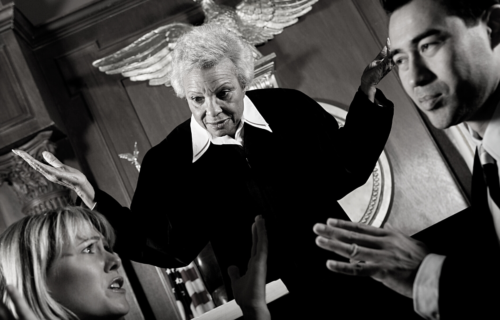
Divorce Mediation: The #1 Thing You Need to Understand
There are two things that set you up for success in divorce mediation: 1) understanding what the process is (and what it isn’t), and 2) having skills to de-escalate conflict and negotiate well. I often hear stories of people getting frustrated and failing at mediation because they’re missing both these important elements. In this post, I want to address the first issue and offer a little insight into what mediation is and what it isn’t so you have the right expectations.
So, what’s the #1 thing you need to understand about divorce mediation? The Mediator is Neutral
That’s right. They don’t take sides, they aren’t there to ensure a “fair” agreement, they don’t insert their own opinions, and they don’t give legal advice. A mediator is not a judge or an arbitrator. They serve as a neutral party to help the two of you facilitate a conversation, resolve your differences and get to an agreement. That’s why it’s called alternative dispute resolution. Because it is an alternative to the litigation process where you each make your case and someone else (like a judge or magistrate) makes a decision on the outcome.
Here’s an excerpt from the Supreme Court of Ohio’s Core Values for Mediation
Neutrality: The mediator does not seek any particular resolution of the dispute. The mediator usually does not give advice, and the mediator does not make decisions. Neutrality is an important way for the mediator to support party self-determination by focusing on a constructive decision-making process rather than a particular outcome.
Impartiality: The mediator conducts the mediation in a way that is not partial, biased, or prejudiced. The mediator conducts the mediation in an even-handed manner. Impartial conduct removes any impression of favoritism and promotes respect of each party’s exercise of self-determination. Impartiality requires the mediator to avoid having his or her own beliefs, preferences and other personal perspectives substitute for those of the parties.
Fairness of process: Fairness in mediation means that the parties experience the process as being fair to each of them. It is important for each party to feel respected, heard, and included. Sometimes mediators confuse their responsibilities to offer a fair process with a duty to ensure a “fair” outcome for the parties.
Read the full document HERE. Or you can also review the Academy of Professional Family Mediators standards of practice.
So What Does That Mean for You in Divorce Mediation?
In mediation, you must be prepared to advocate for yourself. It is your responsibility to show up with the information and the attitude that put you in the best position. Check out this post for my top mediation tips and this post for more on how to be a better negotiator.
When we say that the mediator is neutral, that means…
They Won’t Tell You What You’re Legally Entitled To
It is your responsibility to do your own due diligence by researching your state’s statutes or consulting with an attorney if you have concerns as to whether or not something is a legal entitlement. Mediation is not bound by the same strict laws a judge would have to use to make decisions about your case. You have the flexibility to come to just about any agreement that works for your family regardless of whether or not it’s what the court would do.
They Can’t “Make” Your Spouse Cooperate or Agree
Divorce mediation is a voluntary process. The mediator cannot force your spouse to turn in financial documents, tell the truth, make payments, or sign an agreement. They also are not able to make your spouse negotiate in good faith, be collaborative in their thinking process, or take your needs into account. Part of your work is to present your proposals and use language that is most likely to land well with your spouse. Being demanding or telling them what the law says they have to do may not be the most effective approach.
They Will Allow “Unfair” Agreements
This one is usually a shock, but the mediator is responsible to ensure that the process is fair – not the agreement. Now that being said, a judge will still review the agreement before it is finalized and if things are too one-sided, the agreement may be called into question. Believe it or not, this can actually be to your advantage if you are a smart negotiator. The way attorneys or the court would do things is not always in your best interest, so mediation offers you to chance to offer creative solutions that meet your needs.
How Can You Make Divorce Mediation Successful?
A recent article by the American Bar Association said that when parties aren’t prepared, the process of mediation can be “disastrous” for everyone involved.
In mediation, you must plan ahead, have a strategy and be a keen negotiator. If you show up like it’s a court battle armed with lots of evidence showing why your spouse is wrong and you deserve this or that, you’re likely to get arguments, defensiveness, and a shutdown of conversation. If you approach disagreements in the same way you handled conflict in your marriage, it’s probably going to go downhill fast. In divorce mediation, you have to keep the end goal in mind – to get what you need. I always tell clients this one rule:
In mediation, you can prove your spouse is a jerk or you can get closer to what you want. You can’t have both.
One of the primary reasons I’ve done extensive mediation training and trained as a pre-mediation divorce coach (PMDC) is because I want you to succeed in mediation. I don’t want you to get frustrated, give up, and proceed to litigation when a little preparation could have made the process work for you. I’ll work with you before and during mediation to help you:
- Understand the process
- Select the right mediator
- Develop proposals
- Understand interest-based negotiation
- Prepare for objections
- Use de-escalatory language
- Manage reactions and emotions
- Make purposeful decisions
Mediation can be a lower-cost, lower-conflict alternative that is effective. But it’s important that you clearly understand the role of the mediator so you can set yourself up for success. Let me know if I can help.
Wishing you strength and wisdom,




